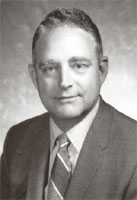|
R. Frank Atwood |
« Back |

Frank Atwood served twelve years in the Washington State Senate, but during his fairly short tenure rose rapidly through the leadership ranks of the Republican Party. R. Frank Atwood: An Oral History provides details on his Senate career, including his expertise in budgetary matters, his strong support for higher education, and his role in introducing much of the executive reorganization legislation proposed by Governor Dan Evans. The interview also offers fascinating insights on the dynamics of leadership and the difficulties that low salaries and the continuing-session concept imposed on our citizen legislators during the 1970s.
Frank Atwood’s political career began when a friend offered to pay the filing fee if he ran for the Bellingham City Council. He won the seat in his first political race and served for six years, including two as president of the council. Disgusted with a legislative taxation measure that adversely affected cities, Atwood then decided to run against the incumbent state senator in the 1962 election, and was elected despite being a Republican in the heavily Democratic Forty-second District. Republicans were also in the minority in the Senate, but Atwood relished the political battles that ensued and quickly learned that "knowledge is power" in the Legislature. His diligence, legal skills, and integrity were only a few of the traits that led to his rapid rise through the Republican leadership ranks. He became Minority Whip in 1965, Minority Floor Leader in 1967, and then Republican Caucus Chair in 1970. He developed a strong interest in the budget and was a member of the Legislative Budget Committee for ten years. During the very difficult economic times between 1969 and 1971, he served with five other legislators on two Free Conference Committees in which they hammered out the final state budgets. Frank was also active in higher education issues and was a particularly strong advocate for Western Washington University, introducing legislation for a variety of new programs, buildings, and other improvements. Although sometimes at odds on issues, Senator Atwood also worked closely with Governor Dan Evans and introduced a number of bills that were part of the Evans legislative agenda.
R. Frank Atwood: An Oral History (PDF)

